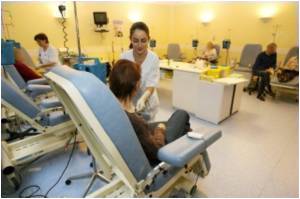Estrogen-only form of menopausal hormone therapy reduces risk of breast cancer in some women, shows research published in The Lancet Oncology.

"These findings are important in that they provide substantial reassurance regarding the safety of estrogen alone use for women with climacteric symptoms initiated close to menopause for duration similar to those used in this study," said Dr. Chlebowski. "Previously, concern regarding estrogen influence on breast cancer may have inhibited women from considering such therapy."
In 1993, the WHI trial of estrogen alone was established to investigate the effects of conjugated equine estrogen on chronic disease. Nearly 11,000 postmenopausal women ages 50 to 79 who had previously had a hysterectomy** were given estrogen or placebo over a period of nearly 7 years. The trial was stopped in 2004 (a year earlier than planned) because of an increased risk of stroke and blood clots.
In this new study, Dr. Chlebowski and his colleagues report the overall effects of estrogen use on breast cancer incidence and mortality, including extended follow-up of 7,645 women (78 percent of the original surviving members) who were tracked from March 2005 until August 2009, a median (midpoint) 4.7 years after stopping estrogen therapy.
The researchers found a 23 percent reduction in the incidence of invasive breast cancer compared with placebo (151 cases, 0.27% per year vs. 199 cases, 0.35% per year) during an overall follow-up period of nearly 12 years, while women in the estrogen group who did develop breast cancer had a 63 percent reduction in deaths from the disease (six deaths, 0.009% per year vs. 16 deaths, 0.024% per year) compared with those in the placebo group.
The lower risk of breast cancer was restricted to women without a history of benign breast disease or a strong family history of breast cancer. They say: "The continued postintervention effect of estrogen on breast cancer incidence is akin to that reported for other hormone-targeted drugs shown to reduce breast cancer incidence."
Source-Eurekalert
 MEDINDIA
MEDINDIA




 Email
Email










